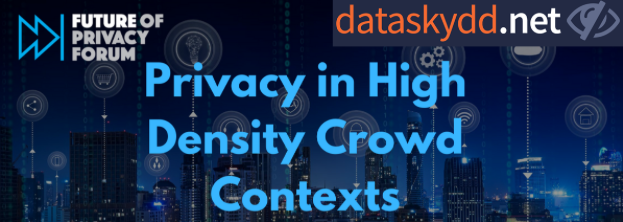
Privacy & Pandemics: Responsible Uses of Technology & Health Data – Day 2 Participant Bios
(Day 1 Participant Bios) Keynote: Katherine Yelick University of California, Berkeley Katherine (Kathy) Yelick is the Robert S. Pepper Distinguished Professor of Electrical Engineering and Computer Sciences(link is external) and the Associate Dean for Research in the Division of Computing, Data Science and Society at UC Berkeley(link is external). She is also the Senior Advisor […]

Privacy & Pandemics: Responsible Uses of Technology & Health Data – Day 1 Participant Bios
(Day 2 Participant Bios) Keynote: Lauren Gardner Johns Hopkins University Lauren Gardner, associate professor in the Department of Civil and Systems Engineering at Johns Hopkins Whiting School of Engineering, is the creator of the interactive web-based dashboard being used by public health authorities, researchers, and the general public around the globe to track the outbreak […]

FPF & Dataskydd.net Webinar – Privacy in High Density Crowd Contexts
Authors: Hunter Dorwart and Rob van Eijk On 30 September 2020, Future of Privacy Forum (FPF) and Dataskydd.net jointly organized the webinar ‘Privacy in High Density Crowd Contexts’. A key aspect of the webinar was the role of industry-driven privacy standards in the development and deployment of privacy-friendly technologies for crowd management, mobile connectivity, and […]

FPF Comments on Draft Washington Privacy Act of 2021
Yesterday, on September 30, 2020, FPF submitted comments regarding the draft Washington Privacy Act of 2021. The draft was released by Senator Carlyle, the Chair of the Washington State Senate Committee on Environment, Energy, and Technology (EET) on September 9, 2020. The new version closely resembles last year’s Second Substitute version of the Washington Privacy […]

Rob van Eijk Discusses Trends in European Privacy Discussions
We’re talking to FPF senior policy experts about their work on important privacy issues. Today, Rob van Eijk, FPF’s Managing Director for Europe, is sharing his perspective on FPF’s EU work, differences between U.S. and EU privacy frameworks, and more. Prior to serving in his position as Managing Director for Europe at FPF, Rob worked at […]

AI and Machine Learning: Leading Academic Publications
Leading academics around the world are focused on the ethical, theoretical, and practical challenges that AI and ML pose – whether in commercial, social, or legal settings – and considering everything from biased algorithms to robot rights. Here is a collectionof many of the leading papers with summaries of their themes * Organized by date […]

Protected: Future of Privacy Forum’s 2020 Annual Meeting
There is no excerpt because this is a protected post.

NSF Convergence Accelerator Workshops
The NSF Convergence Accelerator is a new organizational structure at NSF to accelerate the transition of convergence research into practice. The Convergence Accelerator brings teams together in a cohort, with time-limited tracks that focus on grand challenges of national importance that require a convergence research approach requiring the merging of ideas, approaches and technologies from […]

Five Top of Mind Data Protection Recommendations for Brain-Computer Interfaces
By Jeremy Greenberg, jgreenberg@fpf.org and Katelyn Ringrose kringrose@fpf.org. Key FPF-curated background resources – policy & regulatory documents, academic papers, and technical analyses regarding brain-computer interfaces are available here. Recently, Elon Musk livestreamed an update for Neuralink—his startup centered around creating brain-computer interfaces (BCIs). BCIs are an umbrella term for devices that detect, amplify, and translate […]

FPF Submits Comments Regarding Data Protection & COVID-19 Ahead of National Committee on Vital and Health Statistics Hearing
Yesterday, FPF submitted comments to the National Committee on Vital and Health Statistics (NCVHS) ahead of a Virtual Hearing of the Subcommittee on Privacy, Confidentiality, and Security on September 14, 2020. The hearing will explore considerations for data collection and use during a public health emergency, in light of the deployment of new technologies for […]
